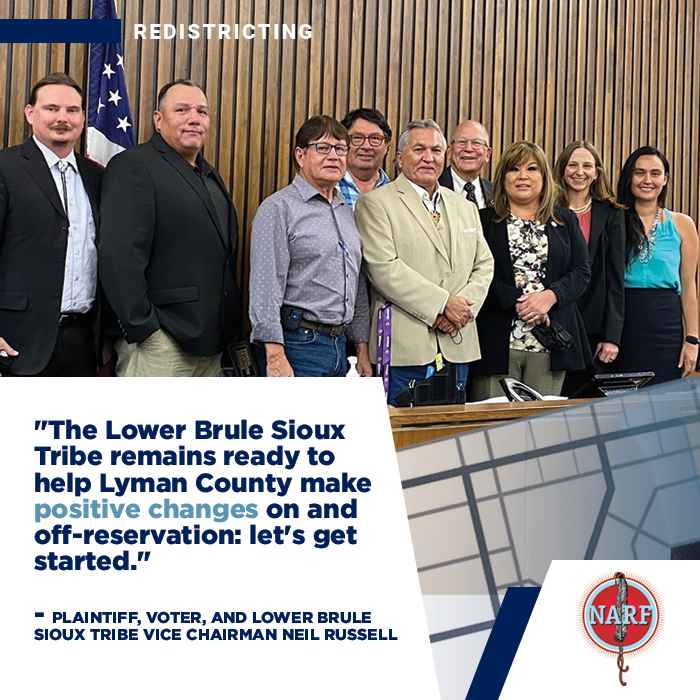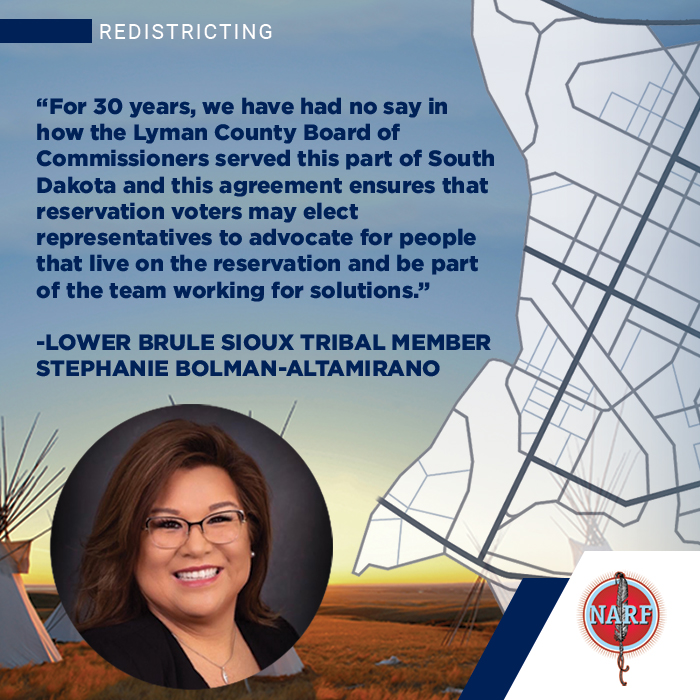Background:

While over 40% of Lyman County voters live on the Lower Brule Reservation, an unfair at-large voting system ensured reservation voters could never elect a single candidate of their choice to the Board of Commissioners. Subsequently, the county commissioners have had little relationship with Lower Brule and community members’ needs, not even managing to maintain a road that crosses into the reservation that it’s obligated to keep functional.
The 2020 Census data showed that overall, the county’s white population decreased in the last decade, while the Native American population increased by over 21%. In the 2020 redistricting process, voters on the Lower Brule Reservation and the Tribe pointed out that to comply with Section 2 of the Voting Rights Act, Lyman County had to change its at-large system and allow Lower Brule Reservation voters the opportunity to elect two out of five commissioners. Instead, the Board of Commissioners sought special legislation through a secretive process with limited ability for opponents to register their concerns, and then announced that it would delay implementing the new district map until 2026.
Native American Rights Fund (NARF), Public Counsel, the Law Office of Bryan L. Sells, LLC, the Law Office of Randy Seiler, and Manatt, Phelps & Phillips represent the tribal government and individual Native voters.
The Litigation:
May 2022: Complaint Filed
On May 18, 2022, the Lower Brule Sioux Tribe and individual voters filed a lawsuit in the U.S. District Court for the District of South Dakota against the Lyman County Board of Commissioners for delaying the rollout of fair election districts. County commissioners adopted a plan to use non-Voting Rights Act-compliant district maps for two additional at-large election cycles before making changes.
“Through this lawsuit we’re insisting Lyman County hold elections with a fairly drawn map in 2022,” said plaintiff, voter, and Lower Brule Sioux Tribe Vice Chairman Neil Russell.

The Lower Brule Sioux Tribe and three enrolled tribal members filed Lower Brule Sioux Tribe v. Lyman County to prevent Lyman County from continuing to violate Section 2 of the Voting Rights Act until 2026. “Like every other county already using new election district maps adopted after the 2020 Census in 2022, Lyman County must comply with the Voting Rights Act and implement the revised district map immediately,” said NARF Staff Attorney Samantha Kelty. “Lyman County cannot continue to disenfranchise voters who live on the Lower Brule Sioux Reservation until 2026.”
“This issue needs to be addressed now: Lyman County needs to comply with the Voting Rights Act sooner rather than later, so candidates we elect in 2022 can begin working alongside the other elected Commissioners,” said plaintiff, voter, and Lower Brule Sioux Tribe Tribal Councilwoman Stephanie Bolman. “Each and every day people who do not represent us make decisions that affect my community. Their decisions over the past three decades have created great disparities across various systems, which continue to have devastating effects on people I care about.”
“I have lived on the Lower Brule reservation all my life. We have a growing community and like all communities, we have issues to resolve and things to fix. I vote, and I hope in 2022 to vote for a person who knows my community and applies the beliefs of our people to problem-solving and thinking about what needs to change,” said plaintiff and reservation voter Ben Janis.
August 2022: Court Grants Preliminary Injunction
County officials in South Dakota required to develop a plan to address Voting Rights Act violations and other redistricting shortcomings
On Tuesday, July 26, the South Dakota District Court in Pierre held a hearing for a preliminary injunction to determine if Lower Brule Sioux tribe voters would have fair districts by the election in November. On August 11, 2022, the court granted the preliminary injunction in favor of plaintiff tribal members. The decision acknowledged that the county’s current redistricting plan would dilute the voting power of the Native community and required the county commissioners to create a new plan for the county elections in November.

The U.S. District Court in South Dakota emphasized the urgency of protecting Native voters’ right to fair elections in Lower Brule Sioux Tribe v Lyman County, granting a preliminary injunction in favor of plaintiff tribal members. “Cooperation between the Tribe and the County, between Tribal members and non-Tribal members, is crucial to the future of Lyman County. If the County does not come forward with an appropriate remedial plan, this Court can impose its own,” said Chief Judge Roberto A. Lange in the decision.
“The Lower Brule Sioux Tribe remains ready to help Lyman County make positive changes on and off-reservation: let’s get started,” said plaintiff, voter, and Lower Brule Sioux Tribe Vice Chairman Neil Russell.
The decision acknowledged that the county’s current redistricting plan would dilute the voting power of the Native community and requires the county commissioners to create a new plan for the county elections in November. “This decision affirms that gatekeepers must make inclusive changes protected by the Voting Rights Act in a timely fashion and acknowledges that everyone benefits when local governments cooperate with tribal governments like the Lower Brule Sioux Tribe,” said NARF Staff Attorney Samantha Kelty.
“The judge ordered the county to work with the Lower Brule Sioux Tribe, and I hope they will take this opportunity as fresh start to achieve a shared goal of preparing to hold fair 2022 elections,” said plaintiff, voter, and County Board of Commissioners candidate Stephanie Bolman-Altamirano.
The 49-page order acknowledged the history of Lyman County’s voting patterns, “…the effect of a single county-wide district has been to create a system where the County’s white majority can and largely has blocked election of Native-preferred candidates.”
“I hope the judge’s ruling encourages the County to cooperate with the Tribe to create an election that includes all of us,” said plaintiff, voter, and County Board of Commissioners candidate Ben Janis.
September 2022: Injunction Holds County to Sooner Rollout
On Friday, September 2, the court again ruled in favor of the Lower Brule Sioux Tribe and individual Native voters in a preliminary injunction that prevented Lyman County Board of Commissioners from delaying fair elections until 2026. The judge determined the county had not left enough time to prepare for fair elections in November, must commit to fair 2024 elections, and had proposed redistricting plans that violate the VRA.
“Although the order recognized the lack of time for a remedy this November, the Court’s order is a win for Native American voting rights,” said NARF Staff Attorney Samantha Kelty. “Lyman County’s delays prevented a VRA-compliant general election in 2022. We look forward to the opportunity to win at trial to ensure Native voters will finally have a voice on the Lyman County Board of Commissioners.”
December 2022: Landmark Settlement Agreement
Lyman County Board of Commissioners will immediately appoint a Lower Brule tribal member to serve, as Commissioner Brian Kraus has agreed to resign his position next week.
On December 8, 2022, the Lower Brule Sioux Tribe and the Lyman County Board of Commissioners announced a landmark settlement agreement to accelerate the timeline to provide Native American voters in Lyman County with a fair opportunity to elect candidates of their choice. The Lower Brule Sioux Tribe commends Lyman County Board of Commissioners for taking bold steps to ensure that all voters in Lyman County have a fair opportunity to choose their candidates.
The settlement recognizes that the voices of Native American voters matter. County Commissioner Brian Kraus has agreed to resign his position as a commissioner on December 13, 2022, paving the way for the county commission to appoint an enrolled Lower Brule tribal member to complete his term of office. The consequential appointment of a Lower Brule tribal member as a commissioner will mark the first time in Lyman County’s history that a tribal member will vote on county decisions that impact the Lower Brule community.

The District Court had previously required that the county move up to the 2024 election when the district encompassing the Lower Brule reservation was required to elect Native-preferred commissioners. The Lower Brule Tribe commends the Lyman County Board of Commissioners, especially Brian Kraus, for agreeing to move even more swiftly so that tribal members will have one voting representative beginning in 2023.
“For 30 years, we have had no say in how the Lyman County Board of Commissioners served this part of South Dakota and this agreement ensures that reservation voters may elect representatives to advocate for people that live on the reservation and be part of the team working for solutions,” said Lower Brule Sioux Tribe Member Stephanie Bolman-Altamirano.
The settlement promotes civic engagement by ensuring that Lyman County takes reasonable steps to inform voters of the new changes to the voting system. Public education will provide tribal members and other voters with the information they need to understand the changes to Lyman County’s redistricting plan. Informing voters in Lyman County of their right to representation encourages public participation in the democratic process.
“This agreement ensures that reservation voters may elect representatives to advocate for people that live on the reservation and be part of the team working for solutions,” said Bolman-Altamirano.
The settlement protects the rights of Native American voters in Lyman County going forward. The consent decree, in effect until 2034, ensures Lower Brule voters have a fair opportunity to elect two seats on the board, as the law entitles them.
“Mutually respectful cooperation can make anything happen and ideally this agreement signals the start of teamwork in Lyman County and on the Lower Brule reservation, and this agreement protects our ability to work together over time.” said Lower Brule Sioux Vice Chair Cody Russell
“This settlement agreement is historic. For the first time, Native Americans will have a voice and a seat at the table in Lyman County. Through compromise, the Tribe and county worked out a resolution that will protect the rights of Lower Brule Sioux Tribe voters for at least the next 12 years,” said NARF Staff Attorney Samantha Kelty.
“Chief Judge Roberto A. Lange got it right: ‘Cooperation between the Tribe and the County, between Tribal members and non-Tribal members, is crucial to the future of Lyman County,’” said Tara Ford, senior counsel at the public interest law firm Public Counsel.
More Cases

